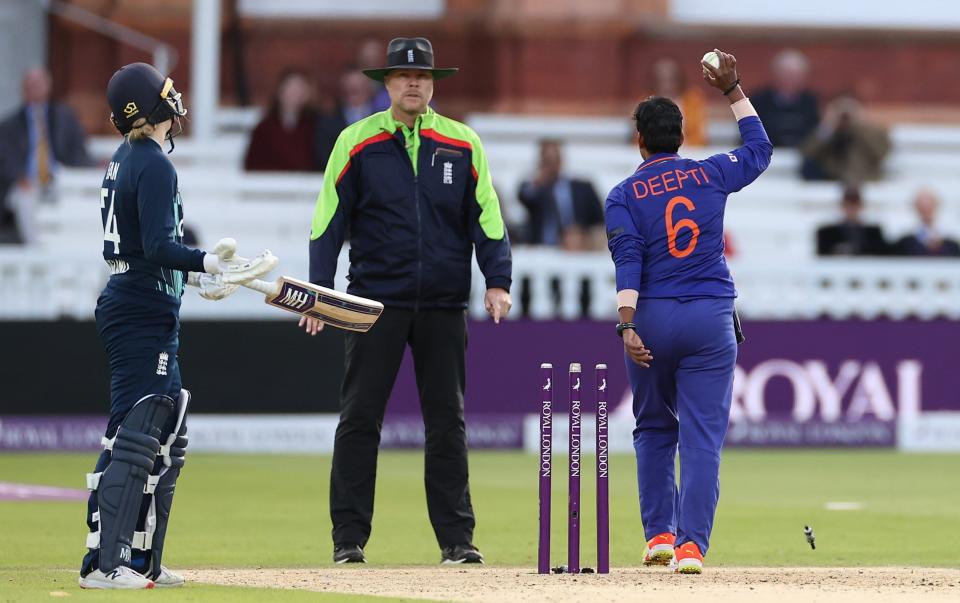Club cricket could ban the Mankad

Club cricket is braced for ugly flashpoints this summer due to the rise in Mankad incidents with some leagues discussing banning the dismissal altogether.
There have been a series of high-profile incidents in the professional game in recent months and there are fears this will inevitably trickle down into the recreational game, where there are already issues over discipline on the field.
The Mankad dismissal, named after Indian cricketer Vinoo Mankad, happens when a bowler runs out the non-striking batsman before delivering the ball. It is controversial but entirely legal.
Both in Australian and South African club cricket there have been incidents recently of Mankad dismissals with footage circulating on social media of angry exchanges during a club game in Victoria.
The Mankad is becoming more widely accepted in the professional game with numerous incidents taking place over the past few months. England’s Charlie Dean was run out backing up by India’s Deepti Shah at Lord’s in September while Mitchell Starc warned a South African batsman during the Boxing Day Test. Most recently there have been examples in the Big Bash and the women’s under-19s World Cup.

The fear is this could lead to confrontations in club cricket in England this summer particularly with confusion among umpires over the recent clarification to the laws.
Two sub-clauses to the law were added by MCC recently to make it clear at what point a bowler can run out a non-striker. It stated the run out can be affected up to when the bowler reaches the “highest point of his/her normal bowling action in the delivery swing.”
One senior club official has cast doubt on whether club umpires will be able to monitor this and expects incidents to blow up this summer, putting more pressure on officials who already report increasing levels of abuse.
“I’m not really sure how we expect umpires to be able to monitor if the bowler has gone past a release point. The further down the structure we go the more wild west it becomes and the concern is that something like a mankad can split opinion,” said Simon Prodger, managing director of the National Cricket Conference. “Umpires might wish to interpret things according to the spirit of the game but feel pressurised into making a decision that might cause aggravation because laws say Mankad is a legal form of dismissal.
“The problem in a club cricket environment is for an umpire to be able to interpret if the process of mankad has been completed properly. It is not going to be easy. He is looking at the front foot and trying to identify if the process by a bowler has competed a run out properly is going to be difficult.”
Telegraph Sport understands the Association of Cricket Officials, an arm of England & Wales Cricket Board, will brief umpires on the law change before the start of the season.
But the concern is that many games below the top tiers of the recreational game are not officiated by qualified umpires which may prompt league officials to decide it is easier to ban the dismissal to avoid confrontation.

“We have to acknowledge that the majority of amateur the game is umpired more often than not by unqualified officials. Further down the league structure you go, players umpire their own game or members of a club not qualified to umpire officiate out of the goodness of their heart,” said Prodger.
“You can see a propensity for Mankading to become a major issue and cause significant flashpoints. It is something we are desperate to avoid. Within the recreational game discipline has been a big issue over the last few years and something the ECB are conscious of. You could well get a situation where individual leagues decide to ban Mankading even though it is within the rules. That is being seriously considered with leagues ready to make a unilateral decision to operate what is happening in their game.”
Mark Butcher, the former England batsman expressed the same fears in a podcast with Wisden last week. “I can just see absolute carnage happening up and down this land and many others if people start doing it as a matter of course in club games," he said.
“Because there’s very little regulation in terms of people’s behaviour there and the game as it is played and has been played for years and years with guys umpiring their own players and that type of thing.”
If leagues ban the Mankad it would enable batsmen to steal ground without the fear of being run out. This would have to be self-policed, leading to more potential problems.

 Yahoo Sport
Yahoo Sport 





































